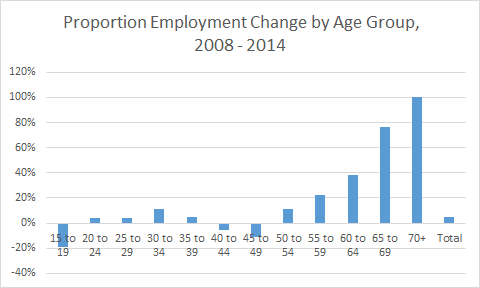Budget Balanced with EI Surplus
Mr. Oliver likes to say that most of the growth in jobs has been high wage, private sector growth. This is simply not true. Two-thirds of net new jobs created between 2008 and 2014 pay below average wages.
Own account self-employment, those self employed workers who have no employees, have dominated growth in self-employment, and account for 1/3 of net new jobs since 2008. Another 1/3 net new jobs are temporary or part-time. And job growth has skewed to older workers, leaving young workers with few opportunities to find meaningful employment.
Nothing in the 2015 Budget does anything to address these issues.
This budget is literally balanced on the backs of workers, as record low EI coverage rates have meant a surplus of $1.8 Billion in the EI Operating Account. Exactly as the PBO predicted, this money went directly into general revenues, and provided the federal government with enough money to book a tiny surplus.
Workers needed that money to improve access to Employment Insurance, so that families that have been rocked by recent layoffs could make ends meet while searching for another job. Right now, new labour market entrants need 910 hours to qualify for benefits, which is nearly impossible to accumulate when working part-time. These workers often must resort to Social Assistance or borrowing in absence of EI benefits.
Cuts to Service Canada have meant months of delays for workers who need to access benefits, and this includes workers accessing critical training opportunities. One of the biggest barriers for apprentices seeking to complete their training is delays in receiving EI benefits.
This budget was superficially balanced, but under the surface are very real imbalances – a generational imbalance, and environmental imbalance, and an infrastructure imbalance.
This government balanced the budget to pay for tax cuts that primarily benefit the wealthy – instead of investing in Canadians and the communities that we live in.


Letter in Vancouver Sun:
Allow deficits to curb unemployment
http://www.vancouversun.com/news/Tuesday+April+Treaty+issues+deep/10988722/story.htmlj
Re: Balanced budget laws don’t have to work perfectly to be useful, Column, April 9
The issue is not whether balanced budget legislation is a good idea, but whether targeting a balanced budget at the national level makes sense. The federal budget is a tool to manage the economy, and good management requires counter-cyclical fiscal policy to keep the economy on an even keel.
When inflation threatens, the government must tax more and spend less. And when the economy is depressed, the opposite — more spending and less taxation — is called for. The budget balance will fluctuate up and down as required. If funding is needed, the government owns a central bank which can always provide it.
Even the Conservative government brags about how thousands of jobs were saved as a result of billions of dollars of stimulus after the financial crisis of 2008. A $200-billion extraordinary financing framework was created to bail out big banks and large corporations. And the Conservatives admit in their proposed legislation that government money must be made available in urgent circumstances such as war.
But Canada has 1.3 million unemployed. Why is that not considered urgent? We know that long-term unemployment leads to increased rates of family breakdown, increased crime rates, increased alcohol and substance abuse, increased suicide rates, increased incidence of mental and physical problems, and lost opportunities for skill development and work experience among the young.
Too many pundits, politicians and academics are prepared to sacrifice the welfare of the jobless by counselling the straitjacket of balanced budgets.
“This budget is literally balanced on the backs of workers”.
True, but it’s also ‘balanced’ on the backs of future generations, because the Harper Regime has created the largest deficits prior to 2015 than any other government in Canadian history. They keep saying they have the future at heart, but little do we all realize it’s passing the buck as opposed to reducing deficits.
Also, the Harper Conservatives wreak havoc with operating budgets in the sense that they fund activities one year, with explicit requirements that those departments not spend any of the money, and then scale it all back in an election year. It’s a classic ‘Mike Harris’ trick that’s been played across the country by Conservatives for the last two decade (with the exception of the bastion of Conservatism and the current Alberta government).
In short, they’re a sham.